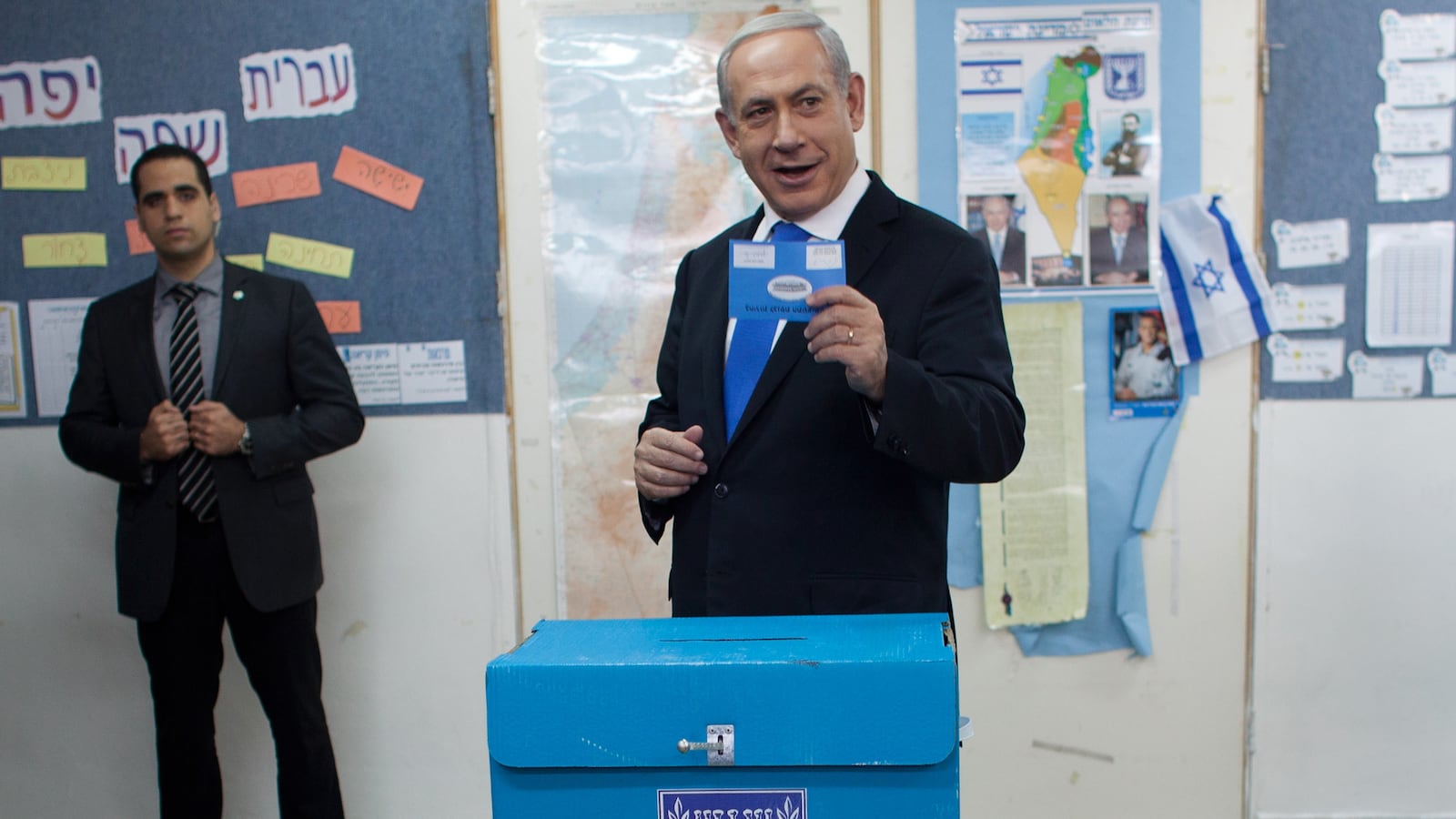The results of Israel’s election are coming in. There have been some surprises, including the fact that the gap between the right-religious bloc and the center-left-Arab bloc is much, much smaller than most had anticipated—3 or 4 seats only. It’s too soon to know what the final shape of the new government will look like, but existing trends combined with the voting results give us some hints of potential coalitions.

If it wasn’t already, it’s clear now that Benjamin Netanyahu made a big mistake by running scared and then running on a joint list with Yisrael Beiteinu. These parties dropped from a combined 42 seats to 31 or so. This has considerably weakened his bargaining position vis-à-vis the other parties that will be clamoring to enter the coalition (and make no mistake—most of them will be clamoring).
Having said that, though, he’ll still have more choice than usual when forming his coalition. With Shas and Jewish Home tied at 12 seats each, and already rivals (different priorities, different religious emphases), Bibi can play one off against the other.At the same time, Yair Lapid’s Yesh Atid—at 17-19 seats the biggest news of the day—is a real contender for a more senior position in government, and could give Bibi a cushion against the smaller parties. Bibi and Lapid already share a basic understanding of the peace process and West Bank settlements, and there is little for them to fight over that issue. Moreover, given the historical record of “third” or “centrist” parties in Israel, Lapid will have to make this election count for him to remain relevant. That means entering the coalition, where he can run a serious ministry, rather than staying outside where he’ll have no effect and will be seen as a one-hit wonder.
I’ve argued before that Jewish Home could well be left out of the coalition, and the election results only strengthen the possibility. Bibi doesn’t want to be tied down to an extremist coalition of Likudniks and far-right parties: recall that he worked to keep the moderates (Dan Meridor, Michael Eitan, Benny Begin) in Likud even after the central committee banished them. A Jewish Home inside the government could band together with hardliners in Likud to force his hand on settlements, causing real problems for his relations with the United States and generating domestic anger.
Nothing is 100 percent certain at this point, and coalition negotiations have led to unexpected outcomes in the past (in 1984, 1990, 2009). But under these conditions, a Likud-Yisrael Beiteinu-Yesh Atid-Shas coalition would reach over 60 seats in the Knesset, and could easily anchor a stable coalition that could be supplemented with United Torah Judaism or Tzipi Livni.
It’s true that Lapid and Shas differ over the haredi draft, but that issue has been used and abused so often that there’s nothing to suggest the Israeli public will rise up over it if nothing is done within the next four years. Besides, Shas has in the past hinted that it could be open to some changes on haredi youth joining the military.
There is also some difference on economic issues: Shas stands for a big role of the state in distributing wealth, while the others are more free market-oriented. But these aren’t mutually-exclusive policies in a country that retains a healthy regard for some socialism and in which nobody wants to completely disenfranchise the Orthodox.
Shas can also see which way the wind is blowing. The revitalization of a religious Zionist party and a growing center-right are real challenges to its position. If it refuses to budge on these issues, it could be replaced.
Contrary to what seems to be the conventional wisdom on the Internets, I also think the election results open up some small space to keep the peace process moving forward. Bibi has shown himself open to signing agreements in the past (Wye River, Hebron), and as I’ve said, I’d call him a “pragmatic opportunist” more than anything else. If he can keep Jewish Home out of the coalition, and bring in parties like Shas and Yesh Atid that are open to peace talks and not committed to settlements all over the West Bank, there’s a basis for discussion with the Palestinians. Bringing in Tzipi Livni—who like Lapid must do something out of the election otherwise her political career is quite possibly over—would strengthen this likelihood even more.
These internal government politics on both foreign policy and domestic social policy can be contained somewhat from the outside by a strengthened Meretz, which doubled its representation to six or seven seats, and a Labor Party that didn’t do as well as initially predicted but still managed 17 seats. If they don’t also enter the coalition (and Meretz won’t), they can still serve as a proper opposition in the parliament should they choose to.
As a side note, I saw some analysts on Twitter wondering whether Yair Lapid could actually garner 61 mandates in the Knesset to overtake Bibi as Prime Minister. It’s possible, but highly unlikely. He doesn’t have the experience to handle the very rough-and-tumble nature of coalition bargaining in Israel, nor is it clear that other leaders think he can maintain discipline in a multi-party government. It would be a surprise if parties chose an untested, un-established newcomer over Bibi.
Leftists have done a lot of hand-wringing in recent days, decrying the emergence of an all-powerful rightist coalition. But I think the election results give some hope against this idea that democracy will vanish overnight in Israel and the West Bank will be overrun with settlers.





